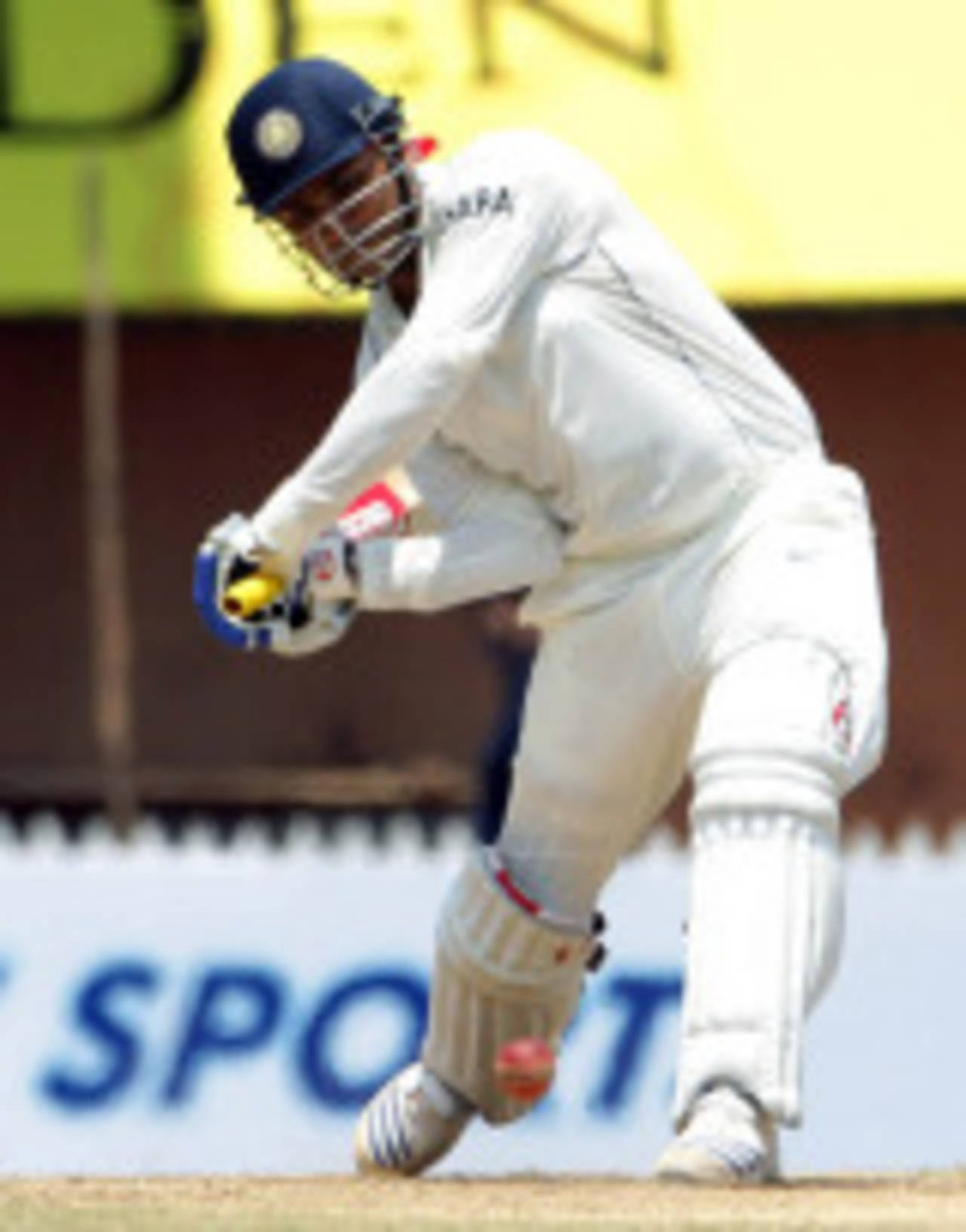The greatest insignificant innings
Sehwag’s own improbable accomplishment richly deserves to be remembered for years, even decades, to come, as one of the most memorable and invigorating individual efforts in the annals of any team sport
Rob Steen
25-Feb-2013

Getty Images
Yes, it induced awe, albeit not exactly shock. After all, Virender Sehwag’s stupendous one-man-band of a show in Chennai was hardly the first time he has cocked a snook at contemporary wisdom. Given that his last 10 Test centuries have all exceeded 150, nobody, not even Adam Gilchrist, has so consistently belied the theory that aggression militates against substance. How can you play the way he does, with such scant regard for protocol or respect for the tried and trusted means of acquisition, and rack up such immense scores? Luck, certainly, had nothing whatever to do with it.
In joining Don Bradman and Brian Lara as international cricket’s only double triple-centurions – and, even more remarkably, becoming the only opener to repeat such a feat – Sehwag, having spent a year on the sidelines, his career in the longer format apparently done and dusted, has completed one of the most gobsmacking comebacks in Test history. But let’s not get carried away. Please.
“Great” is an oft-abused word, one that ranks right up there with “fantastic” as the most distorted of the age: a not-so shining example of how a word in everyday speech does not necessarily translate to print. Greatness is also unquantifiable. Not that that stops us trying to quantify it, or lazily using it as a label when common or garden superlatives seem insufficient. Whatever happened to the likes of “tremendous”, “terrific” or “astounding”, to name but three alternatives? To my way of thinking, greatness is defined as much by durability as quality: will we still be agog at a goal/movie/song/statesman 20 years hence? Context, as ever, is all.
All that said, I have no doubt whatsoever that Sehwag’s knock deserves to be regarded as a great one and will endure as such. It was constructed against the game’s most intimidating pace attack, in the first Test of a series between evenly-matched opponents vying for second place in the ICC rankings, and in response to a towering total. He outscored his partners with such ease that it seemed, as Fred Trueman might have put it, that there were two games going off out there. Ultimately, though, its status is diminished, albeit through no fault of the maker, by the context, ie. its impact on the match result.
By any estimation, the greatest innings, surely, are those that reverse the tide, either saving or winning a match. In their contrasting ways, one stoically defiant, one vigorously counter-attacking, Mike Atherton’s 185 at The Wanderers in 1995 and Stan McCabe’s 232 at Trent Bridge in 1938 stand tall and peacock-proud as stellar examples of the former. Of the latter, in modern times, three of the greatest are unquestionably VVS Laxman’s 281 at Kolkata in 2001, Steve Waugh’s 200 at Sabina Park in 1995 and Viv Richards’s unbeaten 189 at Old Trafford in 1984. In this observer’s view, however, no batting feat, in any form of the game, stands comparison with Lara’s unconquered 153 against Australia at Bridgetown in 1999.
All the essential prerequisites of greatness were present and correct: the standard of the opposition, the state of the game, the difficulty, nay near-impossibility of the task and the sense, as with Sehwag, McCabe and Richards, that he was occupying a completely different plane to that of his colleagues. In guiding the West Indies from 105 for 5, and later 248 for 8, to a matchwinning total of 311 for nine, the greatest left-handed batsman the game has ever known defied all conceivable odds, conjuring victory from impending defeat in a manner never witnessed, either before or since. And no, I steadfastly refuse to use the word “arguably”.
Sehwag’s own improbable accomplishment richly deserves to be remembered for years, even decades, to come, as one of the most memorable and invigorating individual efforts in the annals of any team sport. But, tricky as it is amid the glow of a fresh memory, let’s maintain our perspective and keep a sense of proportion. Yet how can we satisfy those who crave pigeonholes, the better to conveniently define and isolate memories? How about the greatest insignificant innings of all? That’ll do me.
Rob Steen is a sportswriter and senior lecturer in sports journalism at the University of Brighton